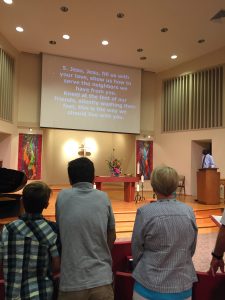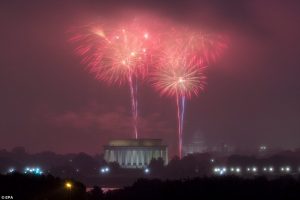The Sunday of Independence Day weekend, I woke up bright and early to attend a worship service at a new church in my neighborhood. Previous weekends, you could find me at what I would consider to be a “popular church”- a well-attended, multi-satellite, free donuts before service kind of congregation located in a theater. You can picture it, can’t you? I’d chosen this welcoming community for the past weeks because I enjoyed the company of a friend who went there. The only inconvenience about this arrangement was that the church was located quite far from where we were living to the point where we had to take a train and walk a significant distance to get there. I had been wanting to support a local congregation for some time, so when my friend went out of town for the weekend I decided to do so then. I spotted a local United Methodist Church one night while roaming the area and had decided that this would be my place.

In the sanctuary singing, “Jesu, Jesu, fill us with your love, show us how to serve the neighbors we have from you…”
Upon arrival, I quickly noticed that this too was a unique community. For one, it was located atop a gas station. Quaint, I thought. What left even more of an impression on me, however, was how eager the church was to extend hospitality to its guests. Walking up to the entrance that Google maps led me to believe existed (sigh), I was guided all along a street that eventually led right up to the door of the church by clear signs that anticipated my history of getting lost (“not all who wander are lost” anyone?). Once I entered, I was greeted by a nice woman who read me like a book. She asked, “You must be new! Are you visiting for the Summer? Perhaps for an internship?”. Coming from a church background where I often offered the hospitality, I was just as eager to be on the receiving end of such warmth in her welcome.
After getting situated in the sanctuary where there were predictably less people in-attendance due to the holiday weekend, I felt good about this decision. There was a different kind of comfort from that which I experienced at the familiar, contemporary-styled church I’d become used to. This comfort was a feeling of being where I needed to be at that moment.
The service began and a man stepped to the pulpit. He announced himself as the guest preacher for this weekend while the home-pastor was away on vacation. The title of the sermon flashed on the projector screen. It read, “Who is My Neighbor?”. I was curious how this message would be similar or different from previous ones I’ve heard in my PK (pastors kid) lifespan. I was not disappointed.
After setting the context of the Biblical narrative as told by Jesus in Luke 10, he changed the direction of the familiar question. He asked, ‘who is not your neighbor?’. Go ahead and read it again, I’ll wait. He explained that the depth of the question as posed to Jesus, who is my neighbor?, is often lost on us as we are quick to answer with a generic response like ‘everyone’. The answer we offer is often so encompassing that its effect is empty. By saying everyone, we actually mean no one because the intentionality and responsibility that should come with that response to who we should specifically be showing care and concern towards is lost. It is hard to admit, but if we are being honest we’ll realize that we do forget about people and sometimes those are the ones who need to be remembered most.

The Independence Day parade ended just as it started to rain on spectators along Constitution Avenue in Washington, D.C. Photo by Marvin Joseph, The Washington Post.
This 4th of July weekend, I could not help but think about the contrast in my own backyard in Arlington, Virginia. The whole weekend I had planned to leave the comfort of my apartment only to move to another comfortable place like a nice restaurant, museum, or festival. Sure, the weather was less than ideal, but I just had to make sure I would see the fireworks from the National Mall. I could and have easily navigated these journeys countless times before but after this sermon (and because of the rain, so much rain) I could not help but pay special attention to the people I saw along the way. There were people who were on the street in various forms – some sleeping, some asking for extra change, and some sitting seemingly content. These were uncomfortable positions to be in. Not just for the individuals who I’m sure would prefer to be elsewhere, but also, to a much lesser extent of course, for me as I fumbled to respond to each of them in the few moments we shared exchanging eye contact in passing.
Why is it so easy for me to justify not showing these individuals as much care, compassion, and concern as anyone else I would consider my neighbor? Is there really so much at stake in doing so? My safety, my time constraints, my own sense of limitations, etc. After hearing this preacher’s sermon and being challenged by my own actions, none of these reasons seemed good enough. They exposed the bottom-line of my thinking, the extent of my care was tied to its convenience. That’s what it was and at least in those moments, it was not trusting in God to work through me which was what I had thought I believed. Based on the way I was acting, they were not, by definition, my neighbors. I had chosen to exclude them.
As I celebrated the 4th of July that next day, I really thought about what it meant for me to have the privilege of living in freedom and with independence (because it was raining all-day this 4th, I felt especially obligated to be reflective). What does it mean to celebrate independence as if the fight for freedom is a thing of the past and forget about those in the shadows still struggling? I determined this much- it is not enough that we are grateful for the hard-fought liberties we benefit from, even if we genuinely express and celebrate that gratitude. To be a good recipient of the gifts we have been given we must use them thoughtfully and responsibly to advance their reach beyond ourselves.
Through this unexpected message, delivered by an unsuspecting messenger, in an unfamiliar place, I was compelled to think differently about my position in that moment. This is exactly what I have been asking for during this season of my CAPS Fellowship. Not about what grand plan I have ahead of me in the future, or about what I should pursue in preparation, but about what God wants of me now. As I’m waiting, wondering, and wandering; I’m glad to find myself newly comfortable being uncomfortable like so many of my CAPS peers. Whether it’s confronting my indecision to care for those neighbors I see in-need on my way to work, or being content with a fuzzy view of fireworks from a wet lawn across the pond; growth is good.
It’s been a few times now that I’ve been reminded not to discount what happens “on the way” towards my destination. That road-map that Google maps so often gets wrong is sometimes just the detour that is needed to get my attention. For the rest of my experience in DC, I will be sure to care not only about what I don’t want to miss out on, but also to those whom I may be missing.

